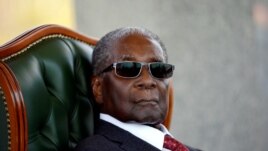06 September, 2019
Robert Mugabe became the leader of the newly named country of Zimbabwe in 1980. That year, the nation won its long fight against British colonialism. The formerly white-ruled Rhodesia and its new leader quickly became the pride of southern Africa. Its farm economy was so successful that it became known as the "breadbasket" of the area.
But white people, who were 5% of the population, owned nearly 75% of agricultural land. In trying to solve this problem, a once well-respected Mugabe government changed. Over almost 40 years as its leader, Mugabe's rule became widely considered corrupt and murderous.
The former president died on Friday at the age of 95, two years after being forced to give up power.

FILE - Zimbabwe's former president Robert Mugabe looks on during a press conference at his private residence nicknamed "Blue Roof" in Harare, Zimbabwe, July 29, 2018.
Amnesty International says that he left behind a non-removable "stain on his country's human rights record."
The human rights group said Mugabe's early years as a leader saw national improvements in health care and education. But as he grew at ease with power, his government began murdering political dissidents. His land reform program was deeply corrupted as well. This led to the collapse of the Zimbabwean economy.
Muleya Mwananyanda is Amnesty International's Deputy Regional Director for Southern Africa. He said Mugabe caused "lasting damage" for Zimbabwe's people.
In 2008, the country experienced a hyperinflation that rose above 500 billion percent.
Those living in the capital city of Harare now find themselves in some of the worst conditions of their lives. There is no running water. There are long lines to buy very costly bread. Millions have emigrated from the country over the years.
"We were promised Canaan," Dadirai Tsvakai of Harare told The Associated Press earlier this year. "But this is hell," he said.
Land reform
Mugabe and many others believed land reform was required to fully end Zimbabwe's racist colonial past. At the time of the country's liberation, a small number of wealthy, white farmers owned 75% of the country's farmland. But the president's plan became a lawless move to gain power and wealth for himself, his family and his political supporters
At first, white farmers refused to sell their land when the government did not offer full value. Land reform stalled.
Members of the pro-Mugabe War Veterans Association started to seize white-owned farms under what came to be known as the "Fast-Track Land Reform Programme."
For the economy, it was the beginning of the end.
Over the next years, the economy fell 40 percent. Zimbabwean money became worthless. Foreign investment fled.
The land seizures resulted in 8 million hectares of land - 20% of Zimbabwe's area – moving to more than 160,000 small, inexperienced farm families.
Many of the most profitable farms were given to important politicians and their families, including Mugabe's wife, Grace. None was an experienced agricultural expert.
Recent studies have suggested agriculture is getting back to mid-1990s level. About 33% of new, black farmers have become "serious" industrial-sized farmers.
Mugabe removed
Mugabe's army ousted him from office in 2017. Emmerson Mnangagwa took power. For a short time, many thought he would lead Zimbabwe's recovery.
But less than a year later, Mnangagwa ordered the military to act against activists who were protesting the country's election. Armed forces shot and killed six protestors.
"Whether we are talking about human rights or the economy, it is as if Mugabe never left. The only change has been for the worse," said Harare-based political expert Alexander Rusero.
"Life was not that good, but it was never this bad," said one man on the streets of Harare Friday morning.
I'm Susan Shand.
The Associated Press and the Reuters News Agency reported this story. Susan Shand adapted it for VOA Learning English. Caty Weaver was the editor.
Write to us in the Comments Section or on 51VOA.COM.
_________________________________________________________________
Words in This Story
pride - n. the highest position or best place
breadbasket - n. a region that provides large amounts of food
stain - n. to damage or spoil
hyperinflation - n. an extremely rapid increase in the price of goods while the value of money quickly decreases
stall - v. to stop moving forward